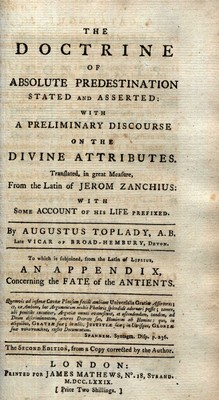 |
|
| Title : The Doctrine of Absolute Predestination stated and asserted; with a preliminary Discourse on the Divine Attributes; translated in great measure from the Latin of Jerom Zanchius. | |
| Author : Jereom Zanchius, translated by Augustus Montague Toplady | |
|
Toplady translated this work by Zanchius's (which the author had originally presented to the Strasbourg Senate in 1562) in1759, Toplady shared his text with John Gill the following year, the great theologian advising Toplady that the text be published. Toplady finally published this work in 1769, comprising of Zanchius's translated text, in two sections "Observations on the Divine Attributes" and "The Doctrine of Absolute Predestination stated and asserted" as well as a sketch on the life of Zanchius and "An Appendix Concerning the Fate of the Ancients". Toplady little suspected the storm of controversy that this work would cause. The very concept of Calvinism was offensive to John Wesley. George M. Ella believes that the passages that Wesley found to be particularly offensive were the quotes that :
and
In 1770 Wesley published a tract entitled "The Doctrine of Absolute Predestination stated and asserted, by The Reverend Mr A_ T_" that abridged Toplady's work and ended with Wesley's words attributed to Toplady:
Wesley had in effect forged a work so as to make it appear to be the Work of Toplady, especially offensive as Toplady had never been a vocal exponent of double predestination and Toplady responded shortly afterwards in 1770 with his work "A Letter to the Rev. Mr. John Wesley relative to his pretended Abridgment of Zanchius on Predestination", Wesley's response was the 1771 pamphlet "The Consequence Proved" that scandalously repeated the lie as to the authorship of Wesley's forgery, the pamphlet commencing with:
Toplady's 1772 response was entitled "More Work for Mr. John Wesley: or A Vindication of the Decrees and Providences of God from the Defamations of a late printed 'The Consequence Proved." Wesley decided to break off his public dialogue with Toplady, as early as 24th June 1770 he wrote to a George Merryweather stating that:
Whatever ill will that Toplady felt for John Wesley it must be remembered that Wesley's behaviour towards him did verge on the criminal, and Wesley never apparently felt any need to regret his actions.
|